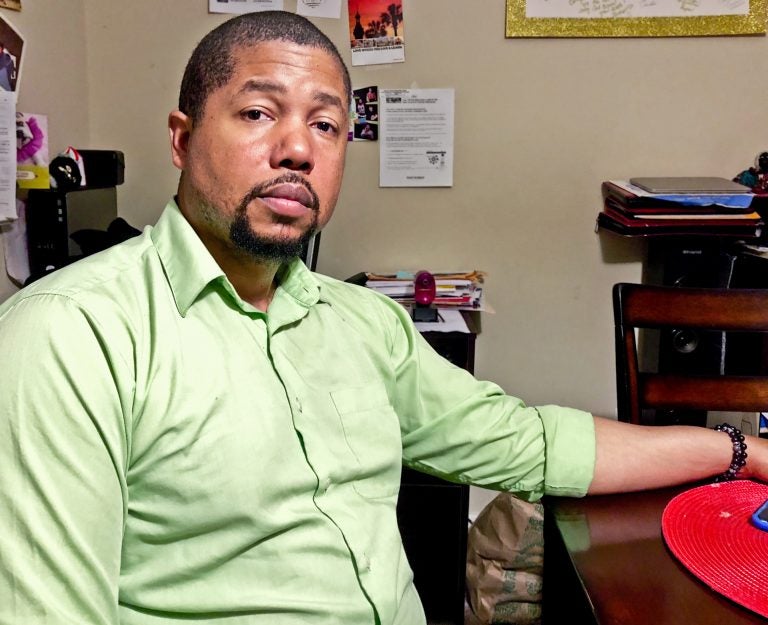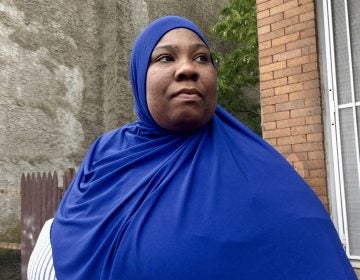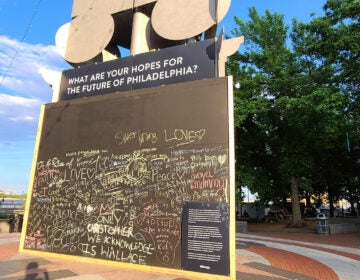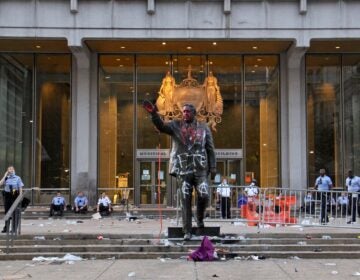Not just Starbucks: Buying a used car while black
Growing up, Wright-El said, he had experienced numerous instances of being profiled and harassed by police officers.

William Wright-El (Darryl C. Murphy for WHYY)
The arrest of two black men waiting for a business partner in a Center City Starbucks back in April put a high-profile spotlight on the discrimination people of color experience every day. Social media hashtags — #nappingwhileblack #movingwhileblack #diningwhileblack #golfingwhileblack #BBQingwhileblack — and almost daily headlines emerged after a slew of incidents in which the police were called on African-Americans who were doing ordinary things.
This week, WHYY is bringing you personal accounts of everyday discrimination that rarely make the headlines.
Buying a used car can be tricky if you’re not familiar with auto mechanics. So when his friend went to purchase a vehicle from a private seller, William Wright-El joined him and another friend, to make sure the deal was legit. He grew up around mechanics who made sure he knew his way around under the hood.
It was early fall of 2010, when the country’s first black president caused many to entertain the idea of a post-racial America.
“Both of us wanted to make sure our friend was getting a good deal,” said Wright-El, now 40, sitting in the dining room of his Chestnut Hill home.
The three men met the seller, an Asian-American man, at a coffee shop near Mt. Airy. Wright-El figured they’d be there for a while, so out of respect for the seller’s business, he bought a cup of coffee.
“If I am going to sit in your establishment,” said Wright-El. “I am going to spend some money there.”
Shortly after, Wright-El went to the parking lot and conducted an inspection of the car. He looked at the engine and underneath the body, checking for leaks and wear that may indicate a serious problem in the near future. Satisfied with what he saw, Wright-El gave his friend, the buyer, a thumbs up to take it for a test drive.
While his friend and the seller were gone, Wright-El and the other friend re-entered the cafe to wait for their return. Again, seeing that they’d be there for a while waiting, Wright-El turned customer, purchasing a croissant. And this time, he chatted up the cashier, an Asian-American woman, who also happened to be the owner, telling her he liked the shop and also shared why he was there.
About 30 minutes passed before the two men returned ready to finalize the sale. Wright-El and the other friend exited the shop and waited in his car, a white Chevrolet Monte Carlo, for the deal to be completed.
Not long after, Wright-El and his friend were approached by two police officers, a white man and a white woman, requesting his license and registration. The key wasn’t even in the ignition, Wright-El said. He was baffled.
“Explain to me what type of vehicle code infraction I’ve committed in a parked car with the key not even in the ignition,” he demanded.
Growing up, Wright-El said, he had experienced numerous instances of being profiled and harassed by police officers. He had guns pulled on him, and has been stopped while driving numerous times. These incidents left a bad impression of law enforcement on him. So when he was confronted by the two officers that day, he became defensive.
But this situation was much different than the others.
Sensing his agitation, one of the officers conceded to Wright-El that the store owner, with whom he had just spoken minutes ago, called the police claiming there were suspicious black men in her cafe.
“My friend and I just spent money in this establishment,” Wright-El said. “And she has the nerve to call the police on us because we ‘look suspicious’? And I spoke with her and told her why we were there.”
Wright-El became more enraged, cursing and shouting, when he saw the owner walk out of the store apologizing. Her excuse, Wright-El said, was that weeks earlier a black man robbed the cafe.
Prior to Wright-El speaking with her, she was concerned after seeing him and his friends entering and exiting the store, because “we were people that she wasn’t used to seeing in her business.”
“So one black guy is going to be the poster child for robbery all over the place now,” said Wright-El. “So, all of us are robbers? So all of us are going to come rob you?”
Eventually, the seller of the vehicle interjected and vouched for Wright-El and his friend, explaining their reason for meeting.
Seeing that the call was a waste of time, Wright-El said, the officers left once the situation became clear, allowing his friend to complete the sale so they could leave. The officers never saw his license or registration.
Wright-El said he hasn’t experienced a situation like that since, but there have been instances where he is profiled, being followed around stores on occasion. These days, however, he confronts his profilers with more calm, calling them out, before no longer patronizing their business.
He said the racial discrimination that occurs today is a sign that “nothing’s really ever changed” for generations of black people.
“We’re seeing what has always been taking place in this country,” said Wright-El. “It’s just that now with social media and the invention of the modern-day cellphones with the cameras on it, it’s in your face 24/7. You have access 24/7. It’s at your fingertips 24/7 and there is no turning a blind eye to it or thinking it’s isolated incidents when this all takes place.”
WHYY is your source for fact-based, in-depth journalism and information. As a nonprofit organization, we rely on financial support from readers like you. Please give today.






